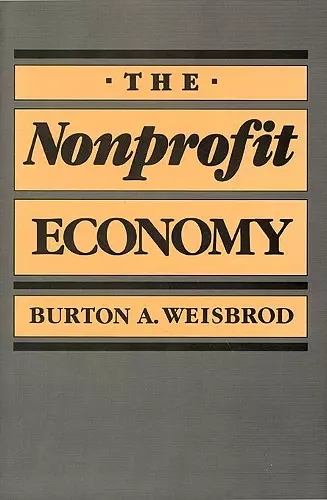The Nonprofit Economy
Format:Paperback
Publisher:Harvard University Press
Published:1st May '91
Currently unavailable, and unfortunately no date known when it will be back

As one who has been struck with the similarities in human motivation in different institutional settings, I might not be expected to like this book. But the book is so interesting, informative and fair-minded that I like it a lot and recommend it to all. -- Mancur Olson, University of Maryland The Nonprofit Economy is a major contribution to an important and neglected subject. The work is thoughtfully analytical, well documented, and clearly formulated. It will be valuable for years to come. -- David A. Hamburg, President, Carnegie Corporation This is a challenging book on a topic of widely underestimated importance. Each of our lives is touched by an array of nonprofit institutions, all ostensibly established and managed for the purpose of serving the public's many interests. Society manages nonprofits largely through a hands-off strategy that assumes they will do well enough if left alone. The Nonprofit Economy raises the compelling issues of the social governance of this diverse collection of vitally important institutions. -- Herman B. Leonard, John F. Kennedy School of Government, Harvard University
Nonprofit organizations are all around us. Written in a clear, direct style without technicalities, The Nonprofit Economy is addressed to a broad audience and deals comprehensively with what nonprofits do, how well they do it, how they are financed, and how they interact with private enterprises and government.
Nonprofit organizations are all around us. Many people send their children to nonprofit day-care centers, schools, and colleges, and their elderly parents to nonprofit nursing homes; when they are ill, they may well go to a nonprofit hospital; they may visit a nonprofit museum, read the magazine of the nonprofit National Geographic Society, donate money to a nonprofit arts organization, watch the nonprofit public television station, exercise at the nonprofit YMCA. Nonprofits surround us, but we rarely think about their role in the economy, or the possibility of their competing unfairly with private enterprise.
Burton Weisbrod asks the important questions: What is the rationale for public subsidy of nonprofit organizations? In which sectors of the economy are they of real importance? Why do people contribute money and time to them and why should donations be tax deductible? What motivates managers of nonprofits? Why are these organizations exempt from taxes on income, property, and sales? When the search for revenue brings nonprofits into competition with proprietary firms—as when colleges sell computers or museum gift shops sell books and jewelry—is that desirable?
Weisbrod examines the raison d’être for nonprofits. The evidence he assembles shows that nonprofits are particularly useful in situations where consumers have little information on what they are purchasing and must therefore rely on the probity of the seller.
Written in a clear, direct style without technicalities, The Nonprofit Economy is addressed to a broad audience, dealing comprehensively with what nonprofits do, how well they do it, how they are financed, and how they interact with private enterprises and government. At the same time, the book presents important new evidence on the size and composition of the nonprofit part of the economy, the relationship between financial sources and outputs, and the different roles of nonprofits and for-profit organizations in the same industries. The Nonprofit Economy will become a basic source for anyone with a serious interest in nonprofit organizations.
This book should be read by anyone interested in the increasingly complex relationships in a liberal democracy between the public and private sectors. Its distinguished author has been conducting research on nonprofits for well over a decade, and he has now produced a first-class account of nonprofits in the American economy. -- Alan Ware * Journal of Public Policy *
An engaging and very readable economic analysis of a form of organization that has been difficult for economic theory to handle. It is a useful source both of information and of stimulating hypotheses. -- Bradford H. Gray * Health Affairs *
Weisbrod has written a provocative and valuable book. It gives new dimension to the debate over the relative roles of the private and public sectors in the American economy. -- Steven Kelman * New Leader *
The public will profit if people in Washington pay attention to Weisbrod. His ideas offer policy-makers a rare advantage: they make sense. -- Richard J. Margolis * Across the Board *
As one who has been struck with the similarities in human motivation in different institutional settings, I might not be expected to like this book. But the book is so interesting, informative, and fair-minded that I like it a lot and recommend it to all. -- Mancur Olson, University of Maryland
The Nonprofit Economy is a major contribution to an important and neglected subject. The work is thoughtfully analytical, well documented, and clearly formulated. It will be valuable for years to come. -- David A. Hamburg, President, Carnegie Corporation
This is a challenging book on a topic of widely underestimated importance. Each of our lives is touched by an array of nonprofit institutions, all ostensibly established and managed for the purpose of serving the public’s many interests. Society manages nonprofits largely through a hands-off strategy that assumes they will do well enough if left alone. The Nonprofit Economy raises the compelling issues of the social governance of this diverse collection of vitally important institutions. -- Herman B. Leonard, John F. Kennedy School of Government, Harvard University
ISBN: 9780674626263
Dimensions: unknown
Weight: 381g
272 pages